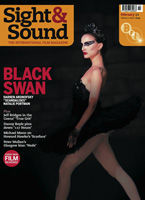News
The February 2011 issue – on sale 4 January

Our February issue spins a series of variations on the theme of individuals in and out of the group around this month’s best films.
We start down a hole with Danny Boyle’s 127 Hours. “I like characters having odds stacked against them,” the Slumdog Millionaire director tells James Mottram, explaining how that film’s success licensed him to pit his kinetic style against hiker Aron Ralston’s account of the time he spent alone pinioned down a crevasse in Utah’s Bluejohn Canyon. Our reviewer Ben Walters enjoys his time in the company of James Franco’s protagonist, who seems like ”the kind of guy to appreciate… the nice irony of taking on the desert single-handed only to leave the desert single-handed.”
Graham Fuller rides the old Indian Territory with a revenge-set 14-year-old girl and Jeff Bridges, the latter filling John Wayne’s boots as Rooster Cogburn in the Coen brothers’ new version of Charles Portis’ frontier novel True Grit. By comparison with the 1969 Henry Hathaway version, the new film is “inevitably the more reflective, violent and realistic version of the two,” finds Fuller – “and a film untouched by [the brothers’ usual] self-consciousness.” Walters also notes in the film “something of the macabre fairytale timbre” of Charles Laughton’s classic The Night of the Hunter (a new edition of which is reviewed in our DVD pages).
Turning to early 1970s Glasgow, actor-director Peter Mullan’s new film Neds is a scalding drama of bad education and gang violence in which a bright young student takes up savage arms against the iniquities surrounding him. “It’s about disaffected youth, having fuck all to do, not knowing who you are,” Mullan tells Demetrios Matheou, explaining why you can’t just blame society, or rely on social-realist depictions: “This problem is a massive, complex cocktail that stretches back to the beginnings of time.” Our reviewer Trevor Johnston meanwhile pays tribute to Mullan’s “purposefully upsetting… highly personal mode of filmmaking, one that (unlike the British norm) hasn’t been developed into docile compromise.”
The classic Hollywood studio director and nouvelle vague favourite Howard Hawks is conventionally hailed, notes David Thomson, as an author of “films about men doing a dangerous job with laconic professionalism. There was a suggestion of realism…” Yet “the way Hawks looked at women, or fantasised them into life, is at the heart of his work.” Thomson explores the influence, echoes and revelations of Hawks’s second wife Nancy ‘Slim’ Gross, the model for Lauren Bacall’s characters in To Have and Have Not (1944) and The Big Sleep (1946), through the quicksilver run of classics Hawks made during the years of their marriage. And modern-day auteur Michael Mann reminisces about the harsh, high streetlights of his childhood while talking us through the finale of Hawks’ 1932 Scarface, an “exquisitely choreographed dialectic of film form and emotion.”
Which brings us to our cover film, Black Swan, in which director Darren Aronofsky turns his quickfire gaze from the sweat-rings of The Wrestler to the equally gruelling, oestrogen-steeped theatre of a ballet company. Natalie Portman is the ingenue whose body fissures and psyche doubles and fractures as she explores her dark side for the twin roles of Swan Lake in a movie which, writes Nick James, “in its best moments… combines the lurid melodrama of Powell and Pressburger’s The Red Shoes (1948) with the delicious kitsch of Robert Aldrich’s Whatever Happened to Baby Jane? (1962).” For our reviewer Lisa Mullen, it’s “a film that speaks, despite its boy-friendly thriller structure, to the abiding concerns of all ‘women’s pictures’: bodily imperfection, impossible male expectation and the terror of old age.” Aronofsky tells James about filming the beauty and destruction of the pursuit of balletic perfection, and how he won entry to the notoriously standoffish dance world; and we highlight six of the most daring cinematic visions of duplicated women.
Our film of the month, however, offers something more… “metaphysical-picaresque”, as Peter Matthews coins it. “With its zombified performances, oracular dialogue and tone of deliberate mystification, The Portuguese Nun is apt to strike the uninitiated as howlingly pretentious, and then some.” But wait and see. Eugène Green’s films “owe so little to the modern, hyper-industrialised ethos of speed, bombast and encrusted formulas that watching them is like having the mote sprung from your eye,” Matthews elaborates. And Green’s fourth feature “seems to consummate his method, achieving the Apollonian calm of a valedictory statement.” Elsewhere, Green explains to Mar Diestro-Dópido why “the past and the future are present in the present…”
Also in this issue, Jim O’Rourke lauds Alan Arkin’s 1971 directorial debut Little Murders, Rob Young reports on the transmogrification of the public-information film, Maria Delgado talks to actor-turned-director Diego Luna, and Charles Gant tallies the box-office fortunes of arthouse cinema in 2010.
We’ve reviews of 40 film releases in total – including The King’s Speech and Blue Valentine – and 18 DVDs, including features on a new edition of Cronos and a 15-film Elia Kazan box-set. And our Books section looks at two new studies of Satyajit Ray, Jonathan Rosenbaum’s latest collection of criticism and surveys of French cinema and the animated feature film.
Subscribe today, save £9 on the cover price, get a free DVD and receive new issues hot off the press and direct to your door!
See also
View our archive
Order back issues, or search our online database of reviews and features from the magazine
